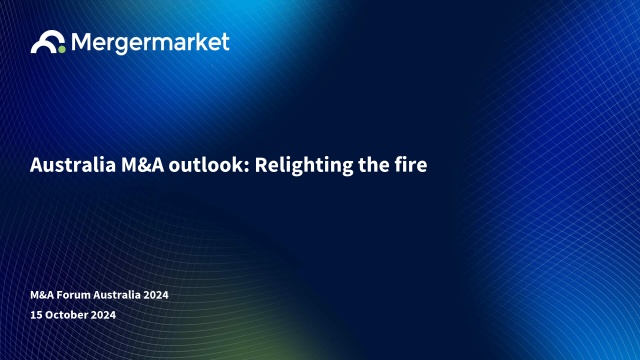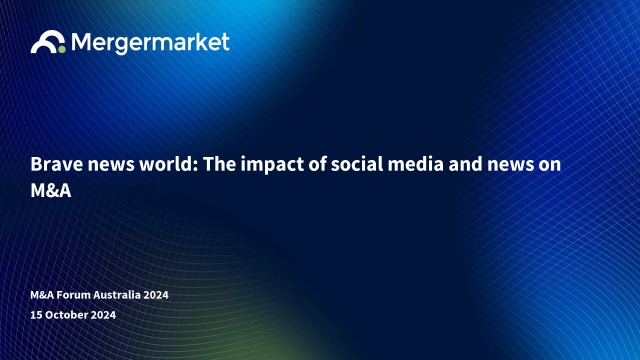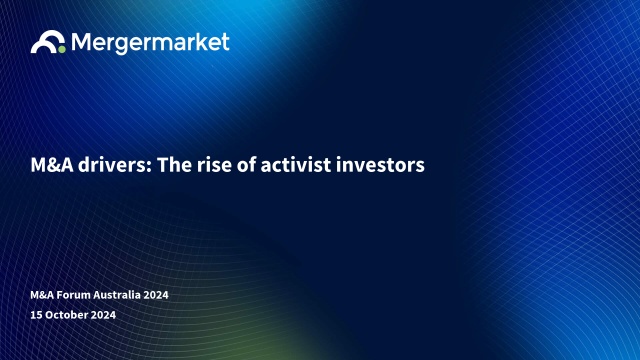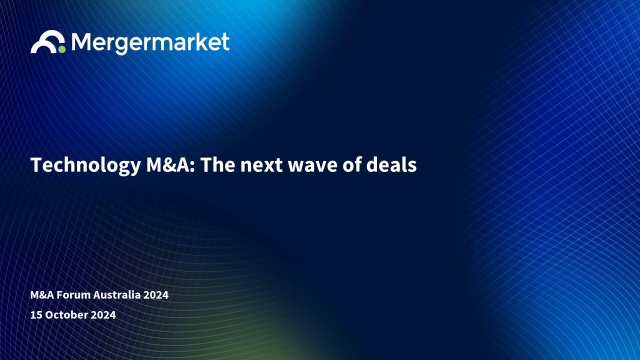Agenda
Registration
Australia M&A outlook: Relighting the fire
An increase in dealmaking is expected in Australia as investor confidence grows and focus switches to segments of the market that are predicted to perform, and value can be found in energy transition, resources, technology, and industrials, among others. Corporates are more active in terms of portfolio rationalisation, and although dealmakers are gaining comfort in a world of instability and a tough economic environment, we are seeing more due diligence and higher hurdles for completion. Our panel of M&A experts will discuss dealmaking in the year ahead, as well as offer their top tips to navigate uncertain waters.
- Have dealmakers seen a shift in opportunities and the types of deal they have been working on?
- Why are deals not completing, and what can be done to manage these risks?
- How are pre-M&A exclusivity rights impacting dealmakers, and what are the pros and cons?
- How will the market fare in 2025 against a backdrop of macro-economic and political uncertainty?
Networking break
Cross-border M&A: Staying ahead of the game
Australia remains an attractive investment destination, particularly for North American and Japanese dealmakers, because of its stability and predictable regulatory landscape. Despite tightening foreign investment regulation, this trend is expected to continue as investors look to tap into a number of growth sectors, including energy and resources. However, while Australia continues to be seen as a deal-friendly market, regulators, particularly FIRB and the ACCC, play an important role, and dealmakers must consider regulatory challenges when sizing up an opportunity. Our panel of senior dealmakers will share their experiences in the region and abroad.
- What factors continue to drive inbound dealmaking in the region?
- How will FIRB and ACCC regulations affect dealmaking in the region?
- Which sectors are seeing the most activity from foreign investors?
- Who will be the most active overseas buyers in 2025, and how has the nature of offshore acquirers changed?
- Outbound M&A: Where and which industries are local participants looking abroad for growth?
Lunch
Brave news world: The impact of social media and news on M&A
One of the key ingredients for successful dealmaking in the age of social media is to have effective communication throughout the M&A process. However, social media and news reporting can take on a life of their own, creating a narrative (true or false) that becomes the story. For M&A dealmakers, it is imperative to develop a robust risk and media management strategy to counter the effects of rumour on a transaction to ensure valuations are not impacted, investor confidence and trust remain high, and the deal is completed. In this session, a panel of seasoned practitioners will share how they think about and act upon this key area in 2024 and beyond.
- What are the risk and real-life examples of deals being destroyed by rumour and false narratives?
- How do you develop strategies to manage the media, public opinion, and mitigate risk?
- How does confidential deal information find its way into the media, and how can you stop it?
- How do you successfully instigate internal and external communication strategies during transactions?
M&A drivers: The rise of activist investors
Activism is not a new phenomenon in Australia. However, it is gaining prominence because of the amount of capital that is now behind activist investing and enhanced transparency, which is due to greater media coverage and public interest. More activist campaigns are likely given the continuing market headwinds and unpredictable macro environment increasing pressure on corporates experiencing periods of underperformance or a challenge to the execution of their business strategy. Only time will tell if the trend reaches these levels in the US, and if more specialist funds seek opportunities. Nevertheless, shareholder activism is increasing. With that in mind, our panel of market experts will assess the impact and outlook.
- What are the typical activist situations, and how are campaigns being structured?
- What sectors are likely to be under the spotlight over the next 12 months, and how will this impact the M&A landscape?
- What can be learned from recent campaigns, both successes and failures?
- What is the role of proxy advisors, and how will this evolve?
- What role do other stakeholders, such as long only and passive investors, play in the success of activism?
Networking break
Private capital: Hunting for deals
While headline deployment has slowed, largely due to a drop-off in large-cap deals, there is a view that deal activity will pick up in the second half of 2024 as valuations normalise and deployment pressure increases. The middle-market remains fertile territory, as do platform deals and bolt-on acquisitions to build scale. However, across alternative asset classes, investors are being more selective, and greater conviction on value and long-term outcomes is required to pull the trigger. GPs must adapt to this fast-changing late-cycle world by revising deal origination tactics and ensuring transactions are structured for resilience. In this session, a group of experienced private market GPs will discuss the current situation.
- What level of comfort do GPs need in the current climate to commit to a deal?
- Are take-privates and bolt-on acquisitions the best options to build scale?
- What sectors are GPs betting on to outperform, and is competition increasing as global and regional players increase their Australia focus?
- What is the outlook for 2025, including opportunities on the horizon and potential pitfalls?
- Has the deal landscape compressed as certain sectors across asset classes become less investable due to macro concerns?
Technology M&A: The next wave of deals
The past 12 months have seen significant changes in the TMT M&A market in Australia, driven by digital acceleration, as top-performing organisations reinvent their business models, using transactions to accelerate transformation and growth. The bid ask spread between vendor and buyer expectations is narrowing, and dealmakers are looking at a range of opportunities, especially in the digital infrastructure and AI space, including data centres and fibre connectivity. Our panel of technology experts will discuss the opportunity set in the sector and debate what the future holds.
- What area of the tech sector has seen the most activity in the last 12 months and why?
- What are corporate buyers looking for in this dealmaking environment, and how have their strategies changed?
- What is the outlook for deals and valuations in the digital space?
- How large is the AI opportunity and what areas should dealmakers focus on to achieve long-term growth?
Close of summit
Cocktail reception
Confirm cancellation
An error occurred trying to play the stream. Please reload the page and try again.
CloseSign-up to join the ION Analytics Community to:
- Register for events
- Access market insights
- Download reports


 play_arrow
play_arrow







 play_arrow
play_arrow




 play_arrow
play_arrow


 play_arrow
play_arrow





 play_arrow
play_arrow





 play_arrow
play_arrow





 play_arrow
play_arrow





 play_arrow
play_arrow
































